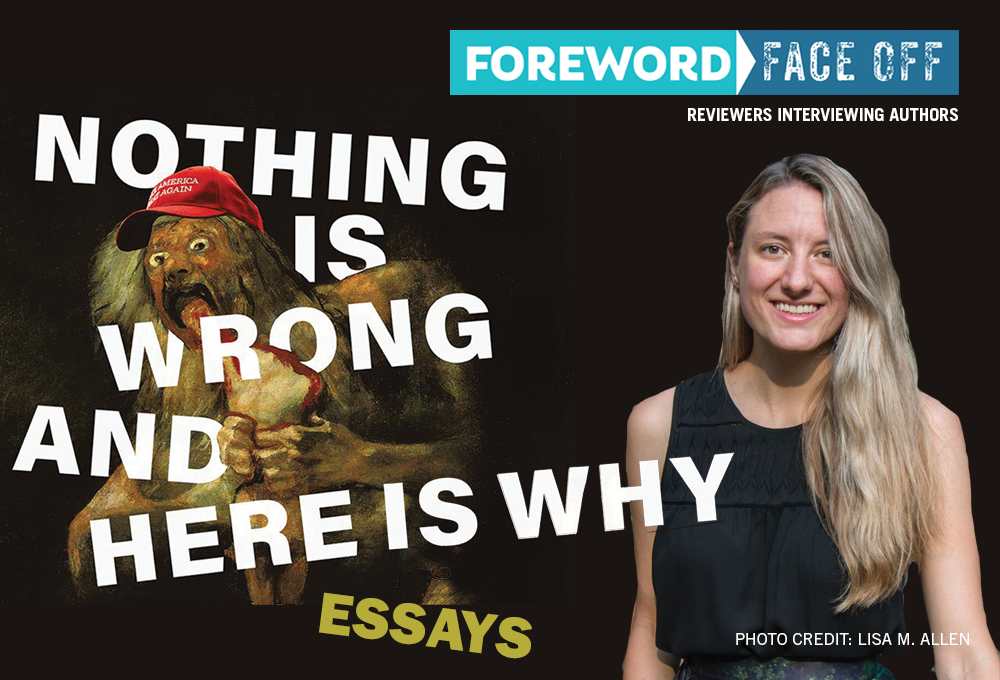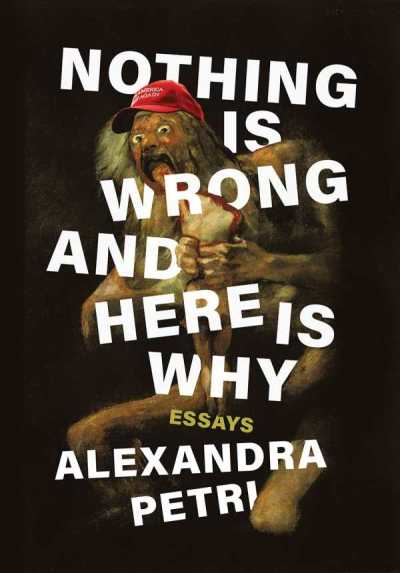Reviewer Michelle Anne Schingler Wisecracks with Satirist Alexandra Petri, Author of Nothing Is Wrong and Here Is Why

In this age of political armageddon, when the world’s most powerful man is often the one dumping kerosene and tossing lit matches at friend and foe alike, all the rules about norms, decorum, fair play, and civil debate have been suspended. What’s left is tit-for-tat retribution. No low is too low. All while this country’s Republican and Democrat leaders urgently need to have a nonpartisan, levelheaded conversation about climate change, immigration, COVID-19, international trade, environmental regulations, and so much more.
And, because of his sharp elbows and willingness to treat politics as a bloodsport, Trump’s nearly impossible to confront—but there are a few left-of-center performers and writers who are up to the challenge. The wonderful surprise is that the most effective Trump opposers are young women. Check out Kylie Scott and Sarah Cooper’s Trump impersonations on TikTok, or the columns of satirist Alexandra Petri in the Washington Post. What makes them so brilliant is that they use Trump’s words and behavior without embellishment. The result is so shocking and hilarious that you don’t know whether to laugh or cry.

When Alexandra’s new essay collection, Nothing Is Wrong and Here Is Why, landed on Managing Editor Michelle Anne Schingler’s desk recently, she pulled a trump card and chose to review the book herself for our July/August issue. (Check out her starred review here.) And the idea for a spirited Q&A between Michelle and Alexandra was just too juicy to pass up.
Thanks to W.W. Norton for help coordinating the logistics.
Michelle, let ’er rip.
Nothing Is Wrong and Here Is Why lends itself to performative read alouds. Part of me wants to take over a children’s story hour with your Melania columns to narrate them princess-story style, and I can’t pretend that my impulse with “I’m Fine with Women in Power, Just Not This One Specific Woman Currently in Power” isn’t to grab a bullhorn and shout it from a street corner. Do you have any objections to these impulses—or any alternative suggestions for sharing your work with the world?
I like these impulses! As long as you and the bullhorn stay a safe distance from other folks on the street! Maybe declaim it out a high window? Or a low window!
Several of your essays play on fairy tale tropes to brilliant effect. What is it about the Trump presidency that lends itself to this particular type of skewering?
I think it’s because fairy tales contain their own logical illogic—or is it illogical logic? One consistent theme of fairy tales is that if you can just complete an impossible demand something equally impossible will be sure to happen. They have this wonderful language of formulas for expected impossibilities, this incantatory logic that conceals real impossibility. “Bring me six hen’s teeth.” Oh well if the recipe calls for six, then there has to be some way of obtaining them. This feels like the same logic that underlies a lot of the demands and conditions of the Trump presidency.
While many of your columns revel in political absurdities, there are also sobering moments in the collection. In particular, “It Is Very Difficult to Get This Train to Stop” stands out. Can you discuss what, if anything, felt different about that column—either in writing it, or in responses to it?
I wrote that column at a moment of just absolute physical and mental exhaustion after Dr. Ford’s testimony. It was also early in my time with my current editor and I had to keep telling him, I swear I’m actually a humor columnist, I’m sorry everything I keep writing is just pulsating rage. It was definitely different because I could not think of anything funny to say.
People react to satire in different ways—sometimes by straight up not understanding that it’s satire. In fact, your column regarding Trump’s first budget made it to his braggadocious newsletter, seemingly in earnest. Was this the most mind-boggling response you’ve received to your work, and/or are there others that you care to mention?
That was pretty bad. I don’t mind the emails saying, “You’re a monster! How dare you advocate such a nonsense position!” The worst possible response is an email saying, “Absolutely! Dead-on!” I get a lot of irate emails and, bizarrely, those are the ones I wind up actually responding to in deep earnest; people have sent really lovely, kind emails and those always leave me speechless and bewildered. I flag them as Things To Write a Thoughtful, Detailed Response To Later, and then six years pass and I realize that I have not written back! (Sorry, people who send nice notes!)
But the ones where they say you are a bag of garbage (they are meaner than that!) really make you want to at least remind them that there’s a person on the other end, and sometimes you wind up actually having a conversation. I am glad actually that I waited to finish these responses until the last possible moment, because I just got two great ones yesterday: someone who wants to turn my piece about Potato Guardians into a short film for fun, and someone else who offered to “take me for a walk any time, no charge” because I wrote a piece from the perspective of a dog. So, that’s fun, I think?
What are the particular challenges and/or rewards of being a satirist in the Trump era? Were there any moments in the last four years that you were hesitant (or, on the flip side, eager) to approach in your column, and why?
I think the Trump era is actually bad for satire because everything is absurd and nothing is funny. The actual thing is already the cartoonishly exaggerated version of the thing that you would make up to parody the thing. Some of it would be ridiculous if there weren’t people inside.
How, if at all, do you approach politics and political subjects in your personal life? Is the subject off limits to friends and family over dinner, for example?
I think it’s hard to avoid the news but I tend to be much more eloquent about my thoughts and opinions on paper—or, er, virtual paper. It’s also much harder to do bombastic pointed overstatement when you are just arguing with your friends. But no, they definitely come up!
Scenario: you are tasked with the divine mission of playing Never Have I Ever live on C-Span with one person from each branch of government. Whom do you pick, and what is your opening gambit?
I DON’T LIKE THIS MISSION. What is the goal here? Am I trying to win? Is this game actually winnable? I am always confused about this game’s mechanics. Is the winner the person who puts down fingers first? Or the person who puts down the fewest fingers? This just sounds like a trick for me to reveal information about my personal life to Mitch McConnell. The only winning move is not to play.
No fewer than three reviewers noted, of your collection, that you are a national treasure. Accordingly, which of DC’s great museums should anticipate an Alexandra Petri exhibit in its future, and featuring which particularly characteristic piece or pieces of yours?
Ha, I don’t know, I just wish there were a mechanism that if you can show that enough people were inexplicably kind enough to say that about you then you get to do the Mixed-Up Files of Mrs. Basil E. Frankweiler thing and stay over in a museum for a few nights. Or, really, in the gift shop. I love museum gift shops because they’re sort of a nice way of telling you what you should have noticed in the museum because it’s on a tote bag. You thought that one space capsule was good? You are a fool! It was the OTHER space capsule! Or, my other pitch is that they put my skeleton in the Natural History museum running away from a T. Rex but they explain that it was many centuries later and I was confused.
Michelle Anne Schingler
